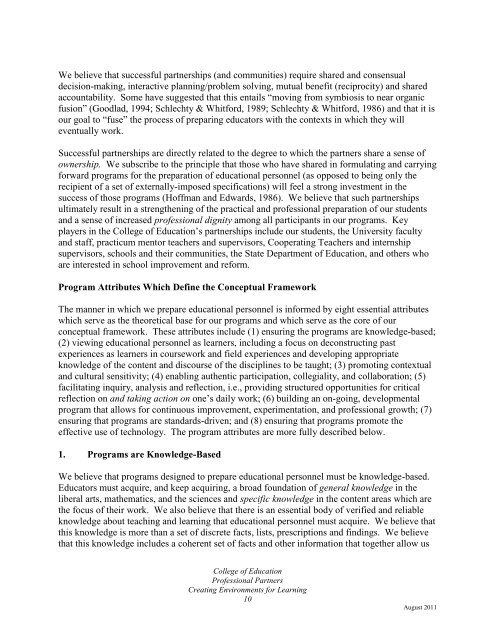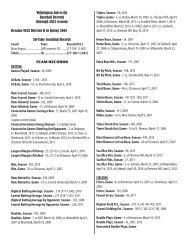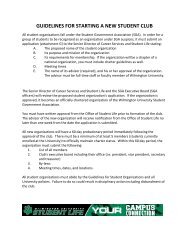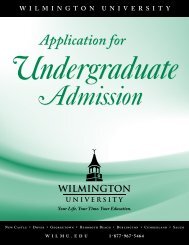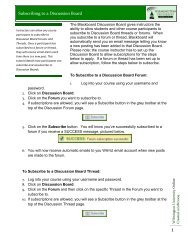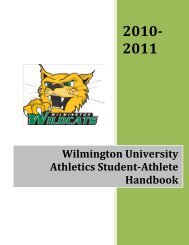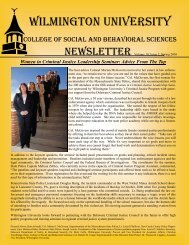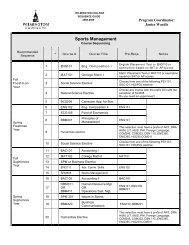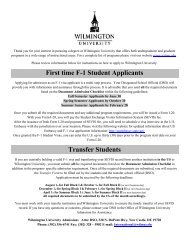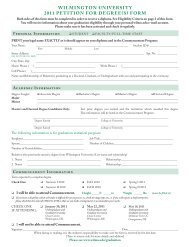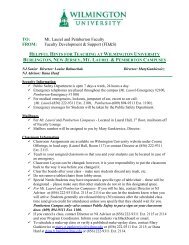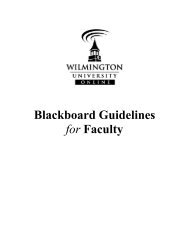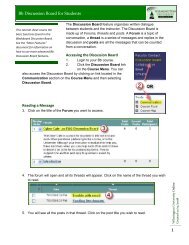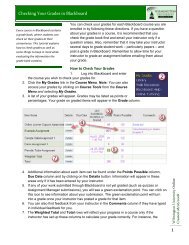We believe that successful partnerships (and communities) require shared and consensualdecision-making, interactive planning/problem solving, mutual benefit (reciprocity) and sharedaccountability. Some have suggested that this entails “moving from symbiosis to near organicfusion” (Goodlad, 1994; Schlechty & Whit<strong>for</strong>d, 1989; Schlechty & Whit<strong>for</strong>d, 1986) and that it isour goal to “fuse” the process of preparing educators with the contexts in which they willeventually work.Successful partnerships are directly related to the degree to which the partners share a sense ofownership. We subscribe to the principle that those who have shared in <strong>for</strong>mulating and carrying<strong>for</strong>ward programs <strong>for</strong> the preparation of educational personnel (as opposed to being only therecipient of a set of externally-imposed specifications) will feel a strong investment in thesuccess of those programs (Hoffman and Edwards, 1986). We believe that such partnershipsultimately result in a strengthening of the practical and professional preparation of our studentsand a sense of increased professional dignity among all participants in our programs. Keyplayers in the College of Education’s partnerships include our students, the <strong>University</strong> facultyand staff, practicum mentor <strong>teachers</strong> and supervisors, Cooperating Teachers and internshipsupervisors, schools and their communities, the State Department of Education, and others whoare interested in school improvement and re<strong>for</strong>m.Program Attributes Which Define the Conceptual FrameworkThe manner in which we prepare educational personnel is in<strong>for</strong>med by eight essential attributeswhich serve as the theoretical base <strong>for</strong> our programs and which serve as the core of ourconceptual framework. These attributes include (1) ensuring the programs are knowledge-based;(2) viewing educational personnel as learners, including a focus on deconstructing pastexperiences as learners in coursework and field experiences and developing appropriateknowledge of the content and discourse of the disciplines to be taught; (3) promoting contextualand cultural sensitivity; (4) enabling authentic participation, collegiality, and collaboration; (5)facilitating inquiry, analysis and reflection, i.e., providing structured opportunities <strong>for</strong> criticalreflection on and taking action on one’s daily work; (6) building an on-going, developmentalprogram that allows <strong>for</strong> continuous improvement, experimentation, and professional growth; (7)ensuring that programs are standards-driven; and (8) ensuring that programs promote theeffective use of technology. The program attributes are more fully described below.1. Programs are Knowledge-BasedWe believe that programs designed to prepare educational personnel must be knowledge-based.Educators must acquire, and keep acquiring, a broad foundation of general knowledge in theliberal arts, mathematics, and the sciences and specific knowledge in the content areas which arethe focus of their work. We also believe that there is an essential body of verified and reliableknowledge about teaching and learning that educational personnel must acquire. We believe thatthis knowledge is more than a set of discrete facts, lists, prescriptions and findings. We believethat this knowledge includes a coherent set of facts and other in<strong>for</strong>mation that together allow usCollege of EducationProfessional PartnersCreating Environments <strong>for</strong> Learning10August 2011
to make judgments, come to in<strong>for</strong>med decisions, suggest desirable practices, and ask importantquestions (Danielson, 2002; Griffin, et. al., 1984; Marzano, 2003).We believe that relying totally upon this body of knowledge is insufficient when makingdecisions about teaching, schooling, and the preparation of educational personnel. We believethat single-minded dependence on empirical knowledge gained from highly disciplined processproductstudies leads to an excessively narrow vision. We believe that theoretical knowledge isof major importance. Theory is particularly powerful in helping educational personnelunderstand and make sense of their professional worlds. We believe that theory can leadthoughtful students to make their own discoveries as a consequence of increased understandings.We believe that theory can also provide a body of shared understandings across groups ofeducators who are trying to come to decisions about how to practice their profession (Hoffman &Edwards, 1986, p. 14).A clear example of this theory-to-practice linkage includes our College-wide ef<strong>for</strong>ts to modeland integrate, in all education coursework and experiences, elements of Adult Learning Theory(Knowles, 2005). Other examples include: how Activity Theory (Nardi, 1996), SubsumptionTheory (Ausubel, 1963), and Brans<strong>for</strong>d’s Theory of Anchored Instruction (Brans<strong>for</strong>d, 1990)relate to problem-based and activity-oriented lesson design; how the work of Sternberg inSuccessful Intelligence (Sternberg, 1999) and Gardner in Multiple Intelligences (Gardner, 1985)link to developing diverse instructional strategies and assessments; and how and why Dewey’sseminal ideas about constructing meaning from experience, collaboration, inquiry, activity andcreativity are even more important in today’s schools. Still other examples of theories thatinfluence our work include how Experiential Learning Theory (Kolb, 1984 and Rogers &Freiberg, 1994) and Trans<strong>for</strong>mation Theory (Mezirow, 1980) helps us to understand the powerand importance of reflection and the need to link learning with prior knowledge and experience;how the work of Lewin and Barker in Field Theory and Behavior Setting Theory (Barker, 1968;Lewin, 1948; and Lewin, 1951) can help educators understand person-environment interactionsand create more effective and appropriate learning environments; and how the theories ofDreikurs and Glasser can help educators develop skills to manage learning and classroomdiscipline and discipline in the school more effectively (Dreikurs, et. al. and Glasser, 1965).A third conception of knowledge deals with how educational personnel deal with issues that aremulti-dimensional, unpredictable, highly interactive, urgent, and increasingly related to societalpressures and influences (Doyle, 1977). Responses to this complexity are founded in what wecan term propositional knowledge. Propositional knowledge refers to those ideas <strong>for</strong> schoolingactivity that are put <strong>for</strong>th as proposals and suggestions <strong>for</strong> change that have yet to be givenempirical or theoretical tests of effectiveness. Such knowledge is important <strong>for</strong> its promise <strong>for</strong>making desirable changes in educational settings. We believe that propositional knowledge canbe an important base <strong>for</strong> planning and implementing programs related to the preparation ofeducational personnel (Hoffman & Edwards, 1986, p. 15).The fourth conception of knowledge that we believe to be essential to our programs is what theeducational philosopher and researcher, Maxine Green, calls craft knowledge. Craft knowledgerefers to a coherent body of knowledge that has emerged from practical situations, cumulativeCollege of EducationProfessional PartnersCreating Environments <strong>for</strong> Learning11August 2011
- Page 1 and 2: College of EducationHANDBOOK FORCOO
- Page 3 and 4: TABLE OF CONTENTSCollege of Educati
- Page 5 and 6: We envision our students, as they t
- Page 7 and 8: Master of Education in School Leade
- Page 9: group and individual interviews hel
- Page 13 and 14: improved practice, (b) increased st
- Page 15: Improved oral and written communica
- Page 18 and 19: PREREQUISITES:The Teacher Internshi
- Page 20 and 21: Learning Outcomes/Learning Activiti
- Page 22 and 23: 9.2 participate in professional dis
- Page 24 and 25: 13.10 appreciates the importance of
- Page 26 and 27: handbooks. Teacher Interns are aske
- Page 28 and 29: TYPICAL (SUGGESTED) SCHEDULE* FOR 4
- Page 30 and 31: 12. Participate in regular progress
- Page 32 and 33: 37. School/district policies regard
- Page 35 and 36: Finally, I want you to summarize th
- Page 37 and 38: You could also try offering some op
- Page 39 and 40: documentation.Recommend early inter
- Page 41: LESSON PLANNING USING THE WIMU TEMP
- Page 44 and 45: In any event, solo teaching should
- Page 46 and 47: Clinical semester credits may, unde
- Page 49 and 50: In many cases, the rubrics let you
- Page 51 and 52: APPENDIX:BS, MEE, and MAT Program P
- Page 53 and 54: SCORINGELEMENTS1.2 Understanding of
- Page 55 and 56: 2.2 Understanding ofhuman developme
- Page 57 and 58: SCORINGELEMENTS3.1 Understanding of
- Page 59 and 60: Teacher Preparation ProgramsScoring
- Page 61 and 62:
Teacher Preparation ProgramsScoring
- Page 63 and 64:
Teacher Preparation ProgramsScoring
- Page 65 and 66:
6.5Understanding ofhow to maximizet
- Page 67 and 68:
Teacher Preparation ProgramsScoring
- Page 69 and 70:
Teacher Preparation ProgramsScoring
- Page 71 and 72:
8.3 Thecandidatedemonstratesknowled
- Page 73 and 74:
(teacher-designed); (3)publisher-de
- Page 75 and 76:
SCORINGELEMENTSUNSATISFACTORY1EMERG
- Page 77 and 78:
SCORINGELEMENTS10.2 Understands sch
- Page 79 and 80:
strategies, equitablydistributing r
- Page 81 and 82:
SCORINGELEMENTS11.2 Understands how
- Page 83 and 84:
SCORINGELEMENTS12.2 Understands leg
- Page 85 and 86:
13.3 Candidateunderstands theimport
- Page 87 and 88:
Teacher Preparation ProgramsScoring
- Page 89 and 90:
College of EducationMASTER OF EDUCA
- Page 91 and 92:
Implement Strategies - Develop and
- Page 93 and 94:
Implement strategies towards assist
- Page 95 and 96:
CEC Standard -SevenInstructionalPla
- Page 97 and 98:
during discussion, (3)rephrasing qu
- Page 99 and 100:
identify achievementgain and diffic
- Page 101 and 102:
3.5 The candidatedemonstratesknowle
- Page 103 and 104:
Wilmington UniversityClinical Repor
- Page 105 and 106:
What data will indicate that the st
- Page 107 and 108:
of the elements in the rubric?Time
- Page 109 and 110:
Wilmington University Teacher Prepa
- Page 111 and 112:
Wilmington UniversityCollege of Edu
- Page 113 and 114:
Competency 2: Human Development and
- Page 115 and 116:
Competency 5: Learning Environment
- Page 117 and 118:
Competency 7: Instructional Strateg
- Page 119 and 120:
Competency 9: Professional Growth -
- Page 121 and 122:
Competency 12: Professional Conduct
- Page 123 and 124:
Competency 14: Employment - Obtain
- Page 125 and 126:
Narrative Comments (Optional)Teache
- Page 127 and 128:
Delaware Standards: This should inc
- Page 129 and 130:
Formative Assessment (ongoing) How
- Page 131 and 132:
Formative Assessment (ongoing) How
- Page 133 and 134:
REFLECTION SHEETTeacher/Teacher Int
- Page 135 and 136:
.COOPERATING TEACHER STIPENDIn orde


